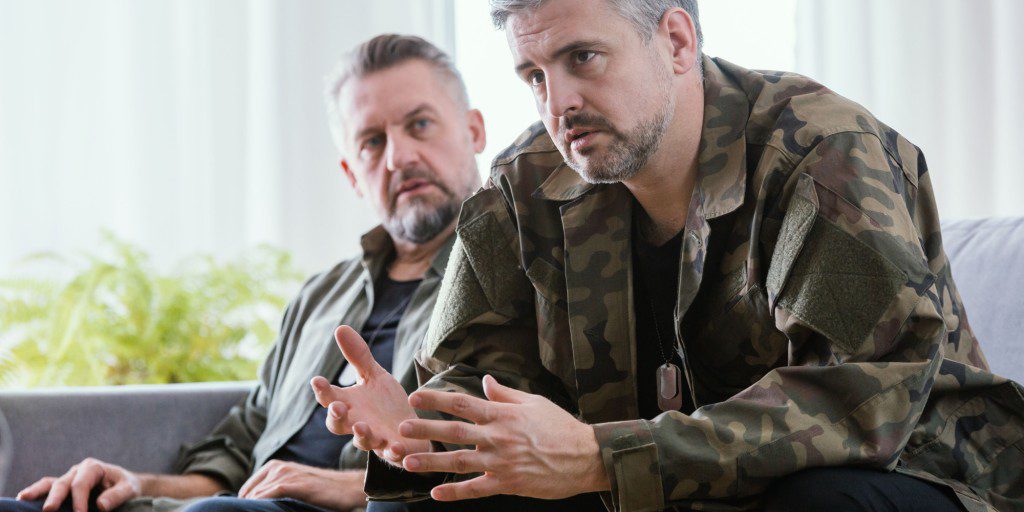When you think of issues affecting veterans, eating disorders may not be the first thing to come to mind. But there is growing evidence that eating disorders like bulimia and anorexia nervosa are relatively common struggles that veterans can face during after their service. And in many cases, the only path toward recovery lies in eating disorder programs like the one offered here at Heroes’ Mile.
But why do veterans face such an increased risk of developing an eating disorder? And why do they so often find routine eating disorder treatments ineffective? Keep reading for answers to all of your questions about how to find the right eating disorder program for you.
Why Do Veterans Develop Eating Disorders?

While each veteran’s circumstances and mental health are unique, the current body of research clearly demonstrates that there is a strong link between trauma and eating disorders. While the cause behind this link is not totally clear, some researchers theorize that this could be due to a perceived lack of control in individuals living with PTSD. PTSD symptoms like avoidance behaviors and traumatic flashbacks can feel overwhelming, and many individuals may look to food as a way to exert control over their bodies.
Of course, this is just one potential cause of eating disorders in veterans, but the overall message is clear: Veterans living with PTSD are more likely to require help via eating disorder programs. This means that veterans who have experienced combat exposure or military sexual assault are at particular risk of developing an eating disorder.
Now that we have established a basic understanding of why veterans face increased risk of developing eating disorders like anorexia, bulimia, or binge-eating disorder, it’s time to look into how veterans can best get eating disorder treatment.
Eating Disorder Programs for Veterans
While veterans face increased risk of developing eating disorders, that does not mean that traditional eating disorder treatment programs can always help them. This is because, like other mental health and addiction issues, veterans experience eating disorders in unique ways. Because disordered eating is so tightly connected with trauma for veterans, civilian eating disorder programs may not be equipped to deal with these less common circumstances.
In these circumstances, it can be hard for military personnel to recover from eating disorders when they may not feel supported or understood by their peers. That’s why a veteran-focused eating disorder program like ours is preferred; with only veterans in treatment and many veterans on staff, individuals often find more understanding and better treatment outcomes when they enroll in veteran-exclusive eating disorder programs.
But what can treatment options can veterans expect when they enroll in our veteran eating disorder program?
Eating Disorder Treatment Options for Military Personnel

At Heroes’ Mile, our veteran eating disorder program includes a variety of evidence-based therapeutic modalities. And with individualized treatment programs, we’re able to cater each individual’s treatment program to their unique struggles and recovery goals.
With that in mind, some of our most common eating disorder treatment options include:
- Group therapy: During group therapy sessions, individuals share their experiences to help identify maladaptive thought patterns. In short, this means recognizing thoughts and behaviors that are self-destructive and contribute to disordered eating. By discussing shared issues with their fellow veterans, individuals in our eating disorder program can learn healthier, more constructive ways of thinking.
- Enhanced cognitive behavioral therapy: In this individual therapy, veterans work with licensed mental health professionals to discuss their relationship with their bodies in order to develop healthier habits.
- Nutritional therapy sessions: Nutritional therapy helps veterans find healthy ways to fuel their bodies without being overly restrictive or damaging their well-being.
- Acceptance and commitment therapy: This type of therapy addresses and eases anxiety symptoms. While this may sound unrelated to eating disorders, it’s important to remember that PTSD is primarily an anxiety disorder, and easing its symptoms often makes it easier to treat eating disorders as well.
- Exercise programming: In our eating disorder program, exercise is a crucial part of recovery. But we focus on exercise as a means of relieving stress, and we also help veterans learn to avoid harmful compensatory behaviors when they cannot exercise, since these behaviors often fuel eating disorders.
These are just some of our eating disorder treatment options, and more may be added or substituted depending on an individual’s unique needs. Similarly, we offer both residential and outpatient options for our eating disorder program. By providing highly customizable care to veterans in need, we do everything in our power to give you the best shot at a successful recovery.
Expert Q&A: Eating Disorders
Are there some common warning signs of eating disorders?
There is no one sign of an eating disorder, however there are red flags. For anorexia nervosa, bulimia nervosa and binge eating disorder these can include excessive “fat, weight or calorie talk,” a pattern of eating a limited choice of low-calorie foods, and/or a pattern of intermittent binge eating on calorie-dense foods. People with anorexia nervosa may excessively exercise or excessively stand, pace or fidget. Some individuals with eating disorders may avoid weight gain following meals by inducing vomiting or abusing laxative, diuretic and diet pills. Feeling self-conscious about one’s eating behavior is common. People with eating disorders often avoid social eating settings and eat alone. In avoidant restrictive food intake disorder, excessive concerns with weight and shape are generally absent, but those affected are at risk for malnutrition due to very selective eating. They may avoid eating many foods due to a variety of reasons including low appetite that is not explained by another medical condition, disgust or sensitivity to many foods, or fear of negative consequences from eating most foods, for example excessive fear of gastrointestinal symptoms such as nausea, vomiting or abdominal pain.
What causes an eating disorder?
There is no single cause of an eating disorder. Eating disorders, like several other psychiatric conditions, often cluster in families, and we now recognize that genetic vulnerability plays a significant role in risk for developing an eating disorder. Genes, however, are only part of the story and environment plays a role too, especially in triggering onset of an eating disorder, often in adolescence or young adulthood. Pressure to diet, or weight loss related to a medical condition or life stressor, can be the gateway to anorexia nervosa or bulimia nervosa. Losing those first five to 10 pounds, in someone who is genetically vulnerable, seems to make further dieting increasingly compelling and rewarding. In some, the starved state can then over time lead to binge eating. And once an eating disorder is established, consequences of restricting, bingeing or purging play an increasing role in sustaining the disorder through alterations in the body’s controls of sensations of hunger and fullness, changes in the motility of the gastrointestinal tract, and altered learning, habit and decision making around what and when to eat.
How can I best help and support someone who has been diagnosed with an eating disorder?
Treatment for an eating disorder is challenging. It involves interrupting behaviors that have become driven and compelling, and overcoming anxiety about doing so. Recovery takes a team, which includes family, friends and other social supports, as well as medical and mental health professionals. Be empathic, but clear. List signs or changes in behavior you have noticed and are concerned about. Help locate a treatment provider and offer to go with your friend or relative to an evaluation. Be prepared that the affected individual may be uncertain or ambivalent about seeking treatment. Treatment is effective, many are able to achieve full recovery and the vast majority will improve with expert care. Treatment assists those affected with an eating disorder to change what they do. It helps them normalize unhealthy eating and weight control behaviors and challenge the irrational thoughts that sustain them. Food is central to many social activities and the practice of eating meals with supportive friends and family is an important step in recovery.
We tend to hear about young women and eating disorders, but are there other groups of people that are more often affected by eating disorders?
Eating disorders do not discriminate and can affect individuals of any age and any gender. Although they are most common in younger women, it is not unusual for older women to have an eating disorder. Some have had one all their life, others were only mildly affected until some life event triggers clinical worsening – a stressor, physical illness, or co-occurring psychiatric illness, such as depression or anxiety. Evidence strongly suggests that anxiety disorders, especially social anxiety disorder, and obsessive-compulsive personality traits increase individual vulnerability to an eating disorder. Eating disorders occur in men and in transgender individuals too. An estimated 10 percent of people with anorexia nervosa and bulimia and a third or more of people with binge eating disorder are male. Avoidant restrictive eating disorder appears to be more common in males than in females.
What is the difference between just overeating on occasion, food addiction and binge eating disorder?
Overeating on occasion, or at festive events such as Thanksgiving, is normal. By contrast, binge eating is the frequent consumption of a large amount of food associated with a sense of loss of control over eating. Bingeing is usually secretive and accompanied by feelings of embarrassment, shame, depression and guilt over the behavior. It often includes eating rapidly, until uncomfortably full, or when not hungry. Food addiction is a controversial term used by some researchers to describe parallels between the difficulties some people experience in limiting eating and substance addiction. Unlike in addiction however, where an individual is addicted to one particular class of drug, it is difficult to identify one food that underlies “food addiction.” Similarly, the withdrawal syndrome caused by dependence on a drug of abuse is hard to demonstrate in overeaters. Despite the similarities between eating disorders and substance abuse, and evidence of the involvement of brain reward circuits in both conditions, the neurobiology of binge eating and of drug addiction are not the same.
Have there been recent developments in research on the treatment of eating disorders?
Research on eating disorders is progressing rapidly. It is now clear that eating disorders are biologically based illnesses, not simple lifestyle choices. Recent genetic work has focused on identifying genes that increase risk for an eating disorder and on epigenetic gene-environment interactions that may contribute to the onset of an eating disorder. Brain imaging research is examining altered decision making around food choice and reward learning in individuals with eating disorders. Other lines of research focus on improving insight into how starvation, exercise and binge purge behaviors dysregulate brain reward circuits and gut-brain signaling, and whether these changes contribute to the driven, compulsive nature of eating and weight control behaviors. This is exciting work that holds promise for developing novel treatments in the coming years.
The most effective current treatments are behavioral interventions that focus on helping individuals with an eating disorder normalize their eating and weight control behaviors. For adolescents with anorexia nervosa, family-based treatment has the best evidence. The focus of effective family-based therapies is on helping parents to support and monitor their child’s meals. For severely ill patients at very low weight, and for many adult patients who are unable to gain weight in outpatient treatment, admission to a specialized residential or hospital-based treatment program can be lifesaving. The most consistent indicator of relapse after intensive treatment is incomplete weight restoration, so reaching a healthy weight is necessary for recovery from anorexia nervosa. Evidence now suggests that weight gain rates of three to four pounds a week are safe even for very malnourished patients under close medical monitoring and 24-hour nursing care. Some programs utilize feeding tubes. However, many behavioral specialty programs are able to achieve weight gain of four pounds a week with meal-based feeding alone in the majority of cases. Close outpatient follow up care following hospitalization is important as relapse risk is elevated for six months following inpatient treatment.
For bulimia nervosa, cognitive behavioral therapy is the most successful outpatient treatment approach. Binge eating disorder also responds to cognitive behavioral interventions. Interpersonal therapy is also effective in both bulimia and in binge eating disorder. Some medications may be useful along with these therapies. Data on treatment interventions for avoidant restrictive food intake disorder is limited, as this disorder was only recently defined, however, it appears that behaviorally oriented treatment approaches are also effective for this condition in many cases.
In general, one of the most important emerging predictors of treatment success for eating disorders across diagnoses is early behavior change. Even in individuals who are initially highly ambivalent about entering treatment, and demoralized by their illness, motivation often increases as they start experiencing progress in controlling their disorder and recognize recovery is within reach.
Enroll in Our Eating Disorder Program in Florida Today
If you’re ready to get help from people who can understand what you’re going through, then it’s time to enroll in our veteran-exclusive eating disorder program. Located in DeLand, Florida, our veteran addiction and mental health treatment center is fully equipped to help you make a complete recovery and regain control of your daily life.
Would you like to learn more about how our eating disorder program can help? Call our friendly admissions specialists at 1-888-VET-NOW2 or ask your questions online. If you’re a veteran living with an eating disorder, then we’ve got your six.
